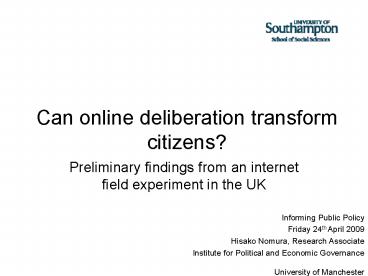Can online deliberation transform citizens - PowerPoint PPT Presentation
1 / 12
Title:
Can online deliberation transform citizens
Description:
Group2: community cohesion (CC) followed by youth anti-social behaviour (ASB) ... Survey 2 Anti-Social Behaviour (ASB) or Community Cohesion (CC) issues. Deliberation ... – PowerPoint PPT presentation
Number of Views:55
Avg rating:3.0/5.0
Title: Can online deliberation transform citizens
1
Can online deliberation transform citizens?
- Preliminary findings from an internet field
experiment in the UK
Informing Public Policy Friday 24th April 2009
Hisako Nomura, Research Associate Institute for
Political and Economic Governance University of
Manchester
2
The project
- One element of the Rediscovering the Civic
research programme - Funded by ESRC/CLG/NWIN
- Joint project of University of Manchester
(Institute for Political and Economic Governance)
and University of Southampton (Centre for
Citizenship and Democracy - Variety of experiments (RCTs, design experiments)
on aspects of civil engagement (voting,
recycling, lobbying, pledging etc) - http//www.civicbehaviour.org.uk/research/
3
Background on online deliberation
- Attempts to encourage deliberation on public
policy are often local and small scale (e.g.
citizens juries) - Information and communication technology (ICT)
potentially offers new possibilities for public
engagement - Opening a new public sphere of the sort
envisioned by Habermas (1962, 1989) - For the public, a new way to engage with others
to discuss - Online discussion
- For the public sector, a new way to extend their
reach - Online questionnaires
- Discussion forums
- Webchats, texting, e-mailing responses,
ePetitions, Interactive voting, opinion meters
etc.
4
Online deliberation
- The internet allows for an opportunity to
scale-up - to involve large numbers without the
costs of physically bringing people together - It is often claimed to promote honesty,
directness in political exchanges and contact
with people from different backgrounds which is
appropriate for deliberation exercise (See
Dahlberg 2001, Witschge 2004) - On the other hand, anonymous encounters online
can exert normative group influence (Postmes,
Spears, Lea, 1998) - In that case, it runs the risk that the online
deliberation experience may be diluted or even
counterproductive
5
Information only vs Deliberation
- There is an ongoing debate in the literature on
deliberative democracy as to whether it is
information alone or information plus
deliberation that has an effect on judgements - Goodin (2003) argues that internal reflection (or
reflective deliberation) is enough interaction
between citizen is not the important factor - Others from public opinion theory argue that
exposure to disagreement (i.e. interaction with
others) does indeed contribute to more
deliberative opinion formation (Price, Cappella
and Nir, 2002)
6
RCT on deliberation
- Social scientist have evaluated deliberative
forums to see if participants change their views,
knowledge and opinions (Drysek 2002, Fishkin
1997, Delli Carpini et al 2004, Price, Nir and
Cappela 2006) - Few randomised control trials testing for the
effect of deliberation (exceptions are Farrar et
al 2003, Iyengar 2005) - Moreover, existing studies have been confined to
small numbers mini publics of participants who
are able to participate in a face-to-face
deliberation. - No experiments testing the deliberative potential
of online discussion forums
7
Research Questions
- To what extent does online engagement amongst
large numbers lead to shifts in policy
preferences and knowledge? - To what extent can online engagement amongst
large numbers be termed deliberative? - What is the value of citizens interaction
compared to the provision of information alone?
8
The RCT design
- 6,000 participants from Ipsos-MORI survey panel
using random quota sampling. - Randomly allocated to 4 treatment and 2 control
groups - 2 x deliberation groups
- Goup 1 youth anti-social behaviour (ASB)
followed by community cohesion (CC) - Group2 community cohesion (CC) followed by youth
anti-social behaviour (ASB) - Access to discussion boards and background
information - 2x information-only groups (video clips and
documents) - 2 x control groups
- All participants completed three surveys
- T1 (before experiment), T2 (after first issue),
T3 (after second issue)
9
CONSORT Flow Diagram
10
Hypotheses
- H1 An internet deliberative forum has an impact
on participants views, knowledge and opinions. - H2 Information alone has an impact on opinion
change - H3 The order of the topic can make an impact on
opinion change. - H4 The impact of deliberation is greater than
information alone - H5 Deliberation results in more opinion shift in
youth anti-social behaviour than in community
cohesion
11
The initial findings
- Just over 50 of the treatment groups took part
in the online activities - Completion of survey was much higher
- 77.5 who had anti-social behaviour topic
completed T2 survey (73.2 of them completed
community cohesion questionnaire in T3) - 76.5 who had community cohesion topic completed
T2 survey - (71 of them completed anti-social behaviour
questionnaire in T3) - No obvious large-scale shifts in opinions.
- Many of the threads read like speak your brains
rather than exchange of opinions and considered
reflection. - There was lack of responsiveness
12
Further analysis
- Application of propensity score matching of those
who actually took part in online deliberation in
the treated group with similar members of the
control group for further analysis - Application of adapted Discourse Quality Index
for qualitative analysis































